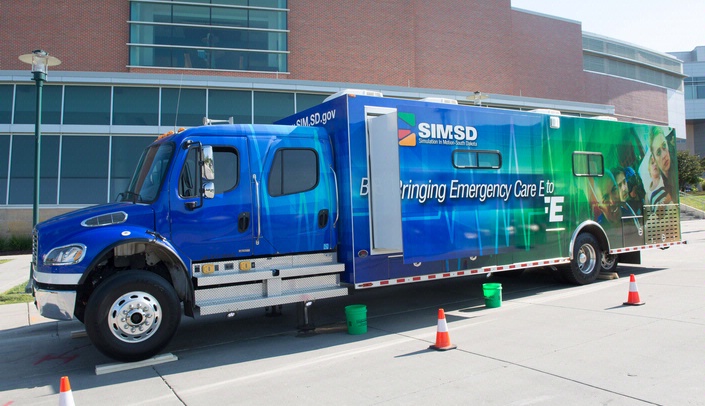The University of Nebraska Medical Center has received a $5.5 million grant from The Leona M. and Harry B. Helmsley Charitable Trust to use mobile, high-tech simulation trucks to provide training opportunities on life-saving procedures for rural emergency medical providers and hospitals.
The Simulation in Motion Nebraska grant includes the purchase of four, customized mobile simulation training trucks and 20 high-fidelity patient simulators (manikins) that will be available to rural emergency medical services, hospitals and universities for training on advanced trauma and cardiac life support.
The trucks are valued at about $500,000 each and the manikins are valued at almost $900,000.
The grant will help fund program operation for three years. Private funding, partnerships, fee for services and state and federal grants will be sought to sustain the project after the first three years.
Walter Panzirer, a trustee of the Helmsley Charitable Trust, said he is excited to add a fourth state to the Simulation in Motion lineup. The program has been implemented in South Dakota, North Dakota and Montana.
"This partnership is a terrific opportunity to improve the health and lives of Nebraskans. Our rural emergency medical responders and rural hospitals face many obstacles to get this critical training," he said. "Now, the training will come to them, which is very important in rural Nebraska."
University of Nebraska President Hank Bounds said rural Nebraska in particular will benefit from the grant.
"Simulation training is an exciting frontier in medicine that offers enormous potential for us to maximize our resources and extend our reach even further," he said. "UNMC is a leader in this area. With this grant, UNMC and its partners will be able to continue their important work in meeting health care needs across our state. I thank the Helmsley Charitable Trust for its generous support, and all our first responders and health care providers for the life-saving work they do every day."
UNMC Chancellor Jeffrey P. Gold, M.D., said the partnership will expand UNMC’s education mission of training Nebraska’s health care workforce.
"The mobile simulation training trucks will provide a phenomenal advantage in training emergency medical service staff where every minute counts," Dr. Gold said. "The mobile nature of this training also supports the vibrancy of communities since emergency responders won’t have to leave their families and businesses to get the training."
Paul Paulman, M.D., UNMC assistant dean for clinical skills and quality, is principal investigator of the grant. Jennifer Adams, M.D., UNMC assistant professor of anesthesiology, is co-investigator.
Dr. Paulman said rural emergency first responders are a key link in the health care system — and in areas of low population density in Nebraska — they may be the only medical providers for many miles.
"The simulation units and manikins funded by this grant will allow state-of-the-art simulation training to be brought to the communities of our rural first responders, thus decreasing some of the training burden for them," said Dr. Paulman, associate dean for clinical skills and quality, UNMC College of Medicine. "Since the number of rural first responders in Nebraska is decreasing, it is essential that we support them as they continue to save lives and serve the citizens of our state."
The units, which are expected to be delivered in January, will be stationed in Norfolk, Lincoln, Kearney and Scottsbluff, where UNMC has nursing college divisions. In Kearney, UNMC has nursing and allied health programs. Training will be conducted by certified emergency medical services instructors.
The rear compartments of the trucks have areas that can simulate an emergency room and an ambulance. The manikins are computerized training tools that talk, breathe, have heartbeats, and can react to medications and other actions of the learners. They can live or die and can be revived over and over again.
Each mobile unit will be outfitted with supplies to recreate an environment as close to reality as possible for the learner. Specially educated trainers will bring real-life, on-site emergency training scenarios to rural health care providers to enhance training and recruit new personnel.
Dr. Paulman credits a team of people with seeing the grant through to fruition, including UNMC employees Patti Carstens, Brian Monaghan, Marissa Stanton, Ph.D., Doug Dekker, and Meg Johnson, University of Nebraska Foundation’s assistant vice president of development.
The Helmsley Charitable Trust has funded over $44.6 million in grants throughout Nebraska, including a $3.5 million grant in 2012 to the Northern Great Plains Personalized Breast Cancer Program. The grant provides women living in rural Nebraska, North Dakota, South Dakota and Wyoming with greater access to personalized breast cancer care. The collaborative effort includes the Fred & Pamela Buffett Cancer Center at UNMC/Nebraska Medicine, Avera Health's Avera Cancer Institute, Sioux Falls, S.D., Trinity Health Cancer Center, Minot, N.D., Sheridan Memorial Hospital and Welch Cancer Center, Sheridan, Wyo.
The Leona M. and Harry B. Helmsley Charitable Trust aspires to improve lives by supporting effective nonprofits in health, place-based initiatives, and education and human services. Since Helmsley began active grantmaking in 2008, it has committed more than $1.5 billion for a wide range of charitable purposes. Helmsley’s Rural Healthcare Program funds innovative projects that use information technologies to connect rural patients to emergency medical care, bring the latest medical therapies to patients in remote areas, and provide state-of-the-art training for rural hospitals and EMS personnel. To date, this program has awarded more than $278 million to organizations and initiatives in the upper Midwest states of North Dakota, South Dakota, Nebraska, Wyoming, Minnesota, Iowa and Montana. For more information, visit www.helmsleytrust.org.
We are Nebraska Medicine and UNMC. Our mission is to lead the world in transforming lives to create a healthy future for all individuals and communities through premier educational programs, innovative research and extraordinary patient care.
